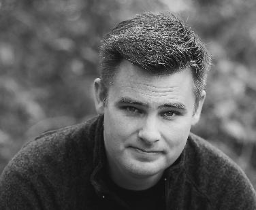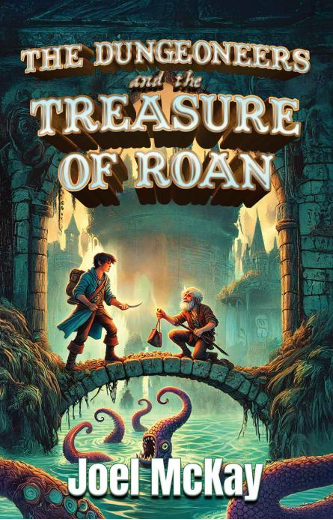I’ve always believed that leaving our world for a fantastic one helps to ground us. Once everything is possible, the stories and experiences must truly be centered on our shared humanity, the human condition, universal truths.
Joel McKay lives reading and writing from comics to journalism to short and long fiction for adults and young adults. Join him here as he shares his love of constructing stories focusing his craft on getting the reader to the next page in simple, accessible language so they can enjoy the ride.
Lyndi: As a long-time fan of comics who stands out to you as your favourite characters and why?
Joel: I was always a fan of tougher-than-nails action comic heroes and also smarter-than-average-types, so my favourites growing up were Wolverine, Spider-Man, Professor X and Dr. Strange. They still are. So you could say I was a Marvel kid circa 80s and 90s. I’m also a big fan of Batman, particularly the Detective Comics.
I grew up on a steady diet of 80s action flicks and fantasy movies, so it’s natural I’d gravitate toward characters that were one-man-armies or who used their intellect to win the day. In fact, I enjoy seeing those two archetypes thrown together with a bit of humour, it hearkens back to serialized stories from that time period. You can see a lot of this in my fiction.
Lyndi: Prior to being a novelist, you did some journalism. What is a memorable moment from your life as a journalist and why the switch to writing fiction?
Joel: There were a lot, but one of the more memorable ones was a deep dive I led into the business case for a hydroelectric dam in Northern B.C., which, at the time, was pegged at a $5 billion project. We were a business-focused publication so it was politically at odds for us to come out with a series of stories that questioned the business case for the dam, but we did and we had the numbers and we were right. There wasn’t one.
I didn’t make any friends with that story. The utility threatened to pull its ads, cabinet members were pissed off, people brought it up with me years after I left the field. I stand by that story to this day.
As it happens, the dam just completed construction and is generating power. It cost $16 billion and won’t generate near enough electricity to offset the impact to the environment or pay for itself. It would’ve been far cheaper to go another route … but what do I know?
I left journalism primarily because the industry was consolidating, hemorrhaging jobs and the pay was terrible. I found I was quite successful in big city media in a short period of time, but I’d hit a ceiling and grew increasingly frustrated that the way to get front page stories was to find controversy. It shouldn’t always be about that and I found myself morally at odds with it.
I moved into public relations and, eventually, public sector executive leadership. It’s not any easier but it’s better for me to be on this side of the fence trying to solve some of the problems I used to report on.
I always wanted to write fiction, long before I got into journalism. But being a print reporter doesn’t leave a lot of time to get into writing novels. When my career changed into leadership roles I found I needed a creative outlet—that’s when I returned to my first passion writing fiction.
Lyndi: How does writing and compiling short stories and a novelette for an anthology differ from writing novels?
Joel: Short stories are more difficult for me. I tend to write long easily so, in some ways, I’m naturally a novel or novella writer. I’ve pushed myself hard to get better at short fiction because I enjoy a good short story and I also subscribe to the belief that it’s an excellent way to become a better writer.
The anthology I published in 2024 – It Came From the Trees and Other Violent Aberrations – was an attempt to pull together some unpublished fiction and create an 80s style spinrack collection of yarns, a potpourri of dark fiction. I took the design, layout, illustrations and text very seriously, the way a musician would in putting together an album. It needed to be more than the sum of its parts and so I took that mindset to its development.
As for novels, I tend to want to craft a complete, fulsome story that can stand on its own. I’m less fussed about design and layout and how the different parts interplay because it’s simply not that kind of art. So I’d say it’s two very different approaches for two very different art forms/products, though they’re both literary.
Lyndi: Why do you think it is important to get people into worlds where anything is possible?
Joel: In a strange way, I’ve always believed that leaving our world for a fantastic one helps to ground us. Once everything is possible, the stories and experiences must truly be centered on our shared humanity, the human condition, universal truths. So we might take the reader some place fantastic or extraordinary, but we’re weaving far more simplistic stories of good versus evil or embedding in the narrative a moral compass that can be more difficult to find in other literature. That’s not to say it’s better by any stretch, there’s room for all kinds of art. But I have always enjoyed that marriage between magical escapism and moral truths. It’s what I grew up enjoying and it’s never faded.
Lyndi: How does comedy mesh with horror in Wolf at the Door?
Joel: Really well, I think. This novella is basically Christmas Vacation meets Cycle of the Werewolf. It takes place entirely in one setting—a house we never really leave—over one night at Thanksgiving. It’s told in two acts: the dinner party being the first part, the slaughterfest being the second. Most of the humour is in the first half as we watch these middle class types struggle with their own interpersonal issues, but it sticks around with a decidedly Canadian, dark flavour once the werewolves show up. I find humour provides the reader with a psychological break during a horror fest, especially a creature clasher. The breaks from the horror help to enhance the overall story and comedy can be an effective way to do that.
Lyndi: The reader target for your newest publication, The Dungeoneers and the Treasure of Roan is young adult. What did you need to consider as you wrote for a younger audience?
Joel: Honestly, I wrote it without thinking about it at all. I was trying to write a fantasy adventure novel I would enjoy. Or, more accurately, my 14-year-old self would’ve enjoyed. The Dungeoneers and the Treasure of Roan is what fell out of my head. It was only two years after the initial draft that I realized I had written a young adult novel. I then edited it with that in mind, passing a filter over it of how the material would stack up in the mindset of a teenager looking for an escape. So one change that was made during the editing process was to lean more into the family dynamics, especially from Sish’s point of view as he ages throughout the story. Hopefully that lands with the younger audience.
Lyndi: What kinds of marketing have you found effective for letting people know about your stories?
Joel: Publicity is the number one thing for me – reviews, blogs, podcasts, getting out there and in front of readers wherever they’re finding new authors and content. Second to that is NetGalley and occasional ads, followed by social media. When I was first published a few years ago social media was more effective, but changes to X and other platforms have fractured that environment to the extent where it’s difficult to make headway and you have to compare the cost benefit of your time. It’s important to be there, no question, but almost as another spot where you can be found and funnel readers to your website, newsletter or where to buy your books.
Joel McKay is an award-winning author, journalist and executive from Northern British Columbia. His fiction includes the horror comedy novella Wolf at the Door, the anthology It Came From the Trees and Other Violent Aberrations and a host of short stories published in various anthologies and online.
Two thieves. One legendary treasure. Zero trust.
and a certain vengeful former crew barreling toward them.
The Dungeoneers and the Treasure of Roan is “Dungeons & Dysfunction” meets Ocean’s Eleven—if everyone in the crew had unresolved trauma and zero impulse control. A darkly funny, fast-paced fantasy adventure full of sharp blades, sharper tongues, and just enough heart to keep you rooting for the worst people to do the right thing... eventually.



